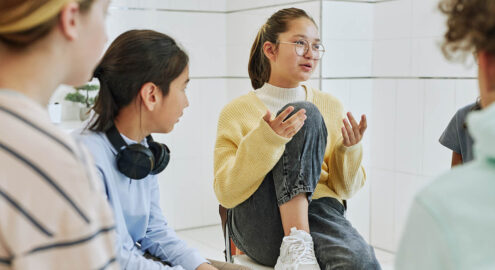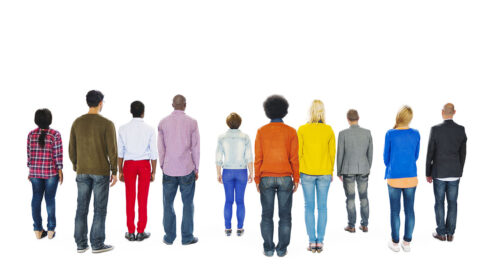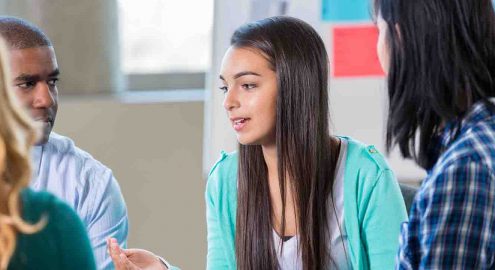What Are They?
Compassion literally means “to suffer together.” It is defined as the feeling that arises when you perceive another’s suffering and feel motivated to relieve that suffering.
Compassion can arise from empathy–the more general ability to understand and feel others’ emotions–but goes further by also including the desire to help. Of course, we can feel compassion without acting on it, and not all helpful acts are motivated by compassion.
When compassion does lead to action, we often call the result kindness. Kindness always includes the intention to benefit other people, especially (though not always) at a cost or risk to ourselves.
Research has shown that compassion and kindness are deeply rooted in human nature–our first impulse is to cooperate rather than compete. Even toddlers spontaneously help people in need out of genuine concern for their welfare.
A high school teacher notices that one of his students is walking more slowly these days, with his shoulders slumped and a sad look on his face. The teacher takes the student aside after class, asking if anything is the matter, and learns that the student’s mother has been diagnosed with terminal cancer. Having lost his own mother at a young age to illness, the teacher’s empathy quickly turns into compassion. He acknowledges the difficult emotions that the student is feeling and offers to put him in touch with a counselor at the school. Moving forward, the teacher checks in regularly with the student, making adjustments to assignments and other classwork as needed.
A school principal who taught for 20 years before becoming an administrator is concerned for the well-being of her staff in the new school year. Before school begins, she takes the time to check in with each staff member in order to create a personal connection, and asks for their ideas of how to prioritize care for the staff. The principal takes these ideas to the first staff meeting and together the staff creates a plan to put their ideas into action.
A new middle school teacher is eager to begin the school year, envisioning a classroom in which all students are motivated to learn, but quickly realizes how difficult it is to make her vision a reality. Not wanting to appear less than perfect, she silently suffers and finds it hard to ask for help. Three months into the school year, another teacher notices the exhaustion on the new teacher’s face and starts checking in with her on a regular basis. The new teacher responds to her colleague’s kindness and realizes that it’s safe to ask for advice. She joins a professional learning community at her school, offering her even more support, and eventually becomes a leader in providing new teacher support.
Why Are They Important?
Research has found that practicing compassion and kindness can improve our health, well-being, and relationships. Of course, beyond our own lives, these qualities strengthen our communities and may even be vital to the survival of our species as a whole.
Kindness and compassion make us happier.
- Compassion training programs, even very brief ones, strengthen reward circuits in the brain and lead to lasting increases in self-reported happiness.
- Compassion training also enables us be more altruistic, and kindness does seem to be its own reward—giving to others activates those pleasure circuits and actually makes people happier than spending money on themselves.
Compassion makes us more resilient.
- Feeling compassion helps us to overcome empathic distress—or the feeling for others that makes us so upset that we want to run away rather than help. We are better able to handle the strong emotions that occur when faced with others’ suffering.
Kindness and compassion are good for our health.
- Feeling compassionate can reduce the risk of heart disease by helping slow the heart rate, and compassion training has been shown to reduce stress hormones and boost the immune system.
- Acts of kindness such as donating money help lower blood pressure.
- People who volunteer are healthier overall, and seniors who volunteer or regularly help relatives and friends have a significantly lower chance of dying.
- Helping others helps people fight addiction.
Kindness and compassion improve our relationships.
- Compassion is associated with more satisfaction and growth in friendships and makes us less vindictive towards others.
- Compassionate behavior is also highly valued in romantic relationships: In surveys of over 10,000 people across 37 cultures, kindness was rated the most important quality in a mate, and the only one universally required.
- Altruism promotes social connections in general and creates ripple effects of generosity in communities.
Kindness and compassion benefit our schools.
- Employees who receive more compassion in their workplace see themselves, their co-workers, and their organization in a more positive light and are more committed to their jobs.
- A compassionate workplace culture is linked to less burnout, greater teamwork, and higher job satisfaction.
- When teachers show kindness (e.g., warmth and child-centered practices), students show increased empathy and prosocial behavior.
Practices

Assessing Your School Climate

Developing the Courage to Speak Up

Listening with Compassion

Building Collaborative Classroom Norms

Behind Your Back

Letting Go of Anger Through Compassion

Energizing School Leadership

Family Business

Making Kinder Classrooms and Schools

Mindful Self-Compassion for Adults

Imagining Flourishing and Kindness: A Mindfulness Practice for Adults

The SEL 3 Signature Practices

Overcoming Obstacles to an Open Heart

Active Listening for School Staff

I See You. Everyone Matters.

Feeling Connected for Adults

36 Questions to Increase Connectedness at School

Staff Meeting Rituals that Build Trust and Community

Do you want to dive deeper into the science behind our GGIE practices? Enroll in one of our online courses for educators!


